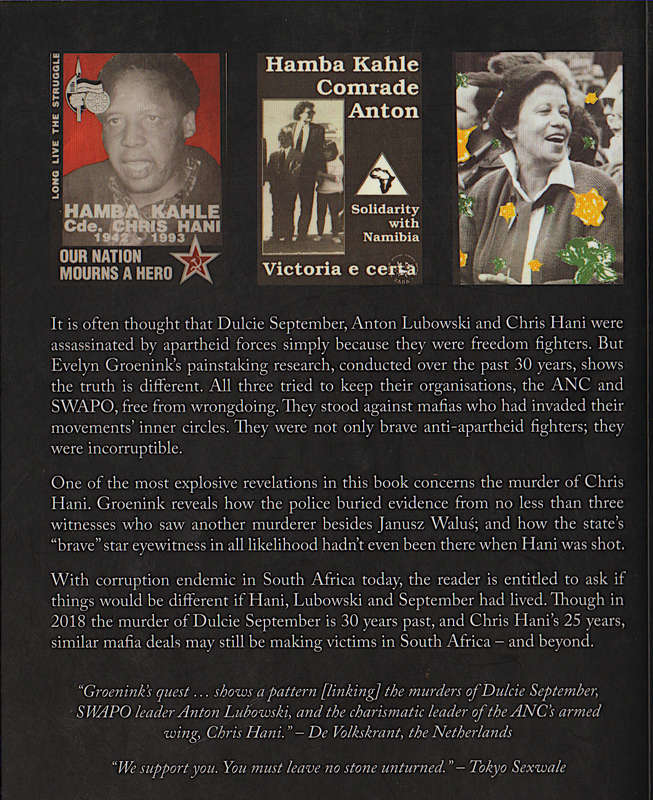Soft Cover
Very good condition
"Incorruptible: The Story of the Murders of Dulcie September, Anton Lubowski and Chris Hani" by Evelyn Groenink is regarded as a vital but unsettling investigation into political assassinations, hidden interests, and the unfinished business of justice in southern Africa.
"Incorruptible" investigates the assassinations of these three prominent southern African anti-apartheid activists.
Evelyn Groenink spent nearly 20 years researching these murders, challenging commonly held assumptions about who killed them and why.
While it is often assumed that all three were targeted by apartheid death squads because they were freedom fighters, Groeninks research suggests a more nuancedand murkierreality. She argues that these individuals posed a unique threat not just to apartheid authorities, but to criminal and corrupt interests within their own liberation movements who wanted to profit from post-apartheid opportunities. All three, Groenink contends, were "incorruptible" in their stance against mafias, arms dealers, and would-be profiteers operating within and alongside the ANC and SWAPO.
Dulcie September was assassinated in Paris in 1988. While most initially blamed an apartheid hit squad, Groenink uncovers evidence pointing to possible involvement of French intelligence and arms industry, linked to secret nuclear and arms deals between France and South Africa. Dulcie, at the time, had discovered secretive arms dealings and was seen as someone who might expose themmaking her a danger to multiple interests.
Anton Lubowski, a leading white SWAPO activist in Namibia, was killed in 1989. Groeninks investigation suggests Mafia involvement, specifically linking Lubowski to Vito Palazzolo, a notorious mafia boss who wanted to set up casino operations in independent Namibia for money laundering. Lubowski resisted these advances, which may have contributed to his death.
Chris Hani, the popular SACP and ANC leader, was officially killed by Janusz Waluś and Clive Derby-Lewis in 1993. Groeninks interviews and evidence reveal that police ignored eyewitness accounts suggesting a second shooter, and that there was prior knowledge of the plot among state and intelligence actors. Hani's vocal opposition to corruptionespecially his past criticisms of ANC arms deal figurespositioned him as an obstacle to both criminal and political interests as post-apartheid South Africa dawned.
The book threads political intrigue and investigative journalism, piecing together testimony, classified documents, and international networks of secrecy. Groeninks style is described as rigorous and unsentimental, avoiding the simplistic hero-villain dichotomies that often characterize anti-apartheid histories.
"Incorruptible" has been praised for its depth, courage, and the new light it sheds on unresolved political murders. The revelations were controversial enough to cause delays in publication and legal threats against the author and her publisher. The books ultimate message warns that corruption and violence did not end with liberation; those who challenged internal wrongdoing were sometimes as much at risk as those who fought apartheid itself.
Groeninks thesis raises uncomfortable questions about the intersection of politics, corruption, and violence in both apartheid and post-apartheid southern Africa. By focusing on individuals who resisted criminalization of the liberation struggle from within, "Incorruptible" reframes the narrative and asks readers to consider the cost of true integrity.





